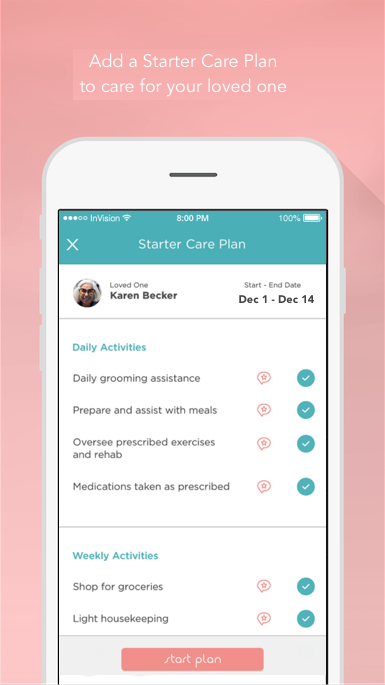Why Care Plans Matter for You as a Patient
The interaction between you and your healthcare provider, e.g., a doctor or nurse, can either motivate you to follow your treatment plan by making it easy for you to understand and follow—or it can leave you confused, scared and clueless on how to best take care of yourself. Only one thing matters when you’re sick—getting better. Your healthcare team is supposed to supply you with a care plan detailing your path back to better health, especially when you leave the hospital. Care plans are important because they lay out what care steps you should take when you’re at home or otherwise away from health settings. However, think about when you receive your care plan—at hospital discharge, right? When you know it’s time to go home, what’s the first and only thing on your mind? GET ME OUT OF HERE!
You’ve just spent three sleepless nights being poked and prodded when all you want to do is feel better. You’re so ready to go home, you’re not listening to the discharge nurse explain how you should care for yourself. Even if you have a family caregiver there with you, it’s likely the person you’ve been complaining to about your hospital experience so she just wants to take you home also. In other words, no one is paying attention to the critical instructions being discussed by the discharge nurse. And therein lies the problem.
The Problems with Current Care Plans
Care plans are discussed when you are not ready to hear and internalize the detailed information on how to care for yourself outside of the hospital. How are care plans given to you in 2015? Paper. If you're lucky, you might get your care plan emailed to you, but even if you do, care plans are often littered with clinical jargon that you may not fully understand and you don’t have a nurse there to explain the plan to you in the moment.
Let's pause for a moment. In 2015, care plans are delivered via PAPER. Paper gets lost easily. The most important steps you’re supposed to take to get you well are delivered on a sheet of paper that is likely to end up in your recycle bin.
OK, you received a paper care plan. Even if you manage not to lose it, that doesn't remove the medical language. How can you follow steps if you don’t fully understand them? The most arrogant of healthcare providers chalk that up to YOUR illiteracy of health language; a language they went to school for six to eight YEARS to learn, but you’re just supposed to understand enough to follow directions.
What Can You Do?
 What can you do to make this care plan delivery process better for yourself? Sometimes you have to take control of your care if your care team isn’t providing the care you need. Here are four ways you can ensure your care is delivered the way that you want:
What can you do to make this care plan delivery process better for yourself? Sometimes you have to take control of your care if your care team isn’t providing the care you need. Here are four ways you can ensure your care is delivered the way that you want:
- When is best for YOU. Make sure your provider gives you the care plan at a time when you are ready to listen. Sure you can get the paper plan at discharge like you normally would, but that’s not the optimal time to receive it. When you are not in a rush, calm, and settled back at home, you will be receptive to understanding the care plan. This is the best time to receive it because you are in your most familiar surroundings. Receiving the care plan and any support information at this point would seem to be more logical, right? It makes one wonder…why is the distribution of the discharge plan only delivered at discharge?
- Ask for your care plan in plain language. It’s not that hard for doctors and nurses to remove the med-speak. Demand that they speak to you in a way that helps you understand the care plan and write it in a way that you can implement the steps when you’re at home.
- Get a digital care plan. At least have it emailed to you so that you can review it at a time when you have the time and aren’t in a rush. There are new technologies that can deliver your care plan via text messages and sequenced by when each step is supposed to happen. Ask your care provider if they have that type of solution for care plan delivery. If not, tell them that they should!
- Get family and friends involved. Actively involve the people who care most about you—your family. They want to help you. Make them part of your family care team. Give them tasks to complete on your behalf from the care plan. That way you have a support structure in place to help you. Your family wants to help, so show them ways that they can.
You CAN take control of your healthcare experience. Don’t be afraid to ask your healthcare team to deliver your care plan in methods that are convenient for you. Your healthcare team wants the same thing you do—for you to get better. Your providers are financially responsible for your care as well, so it’s high time they started treating you like the customer—because, especially when dealing with your own health, the customer is always right.
